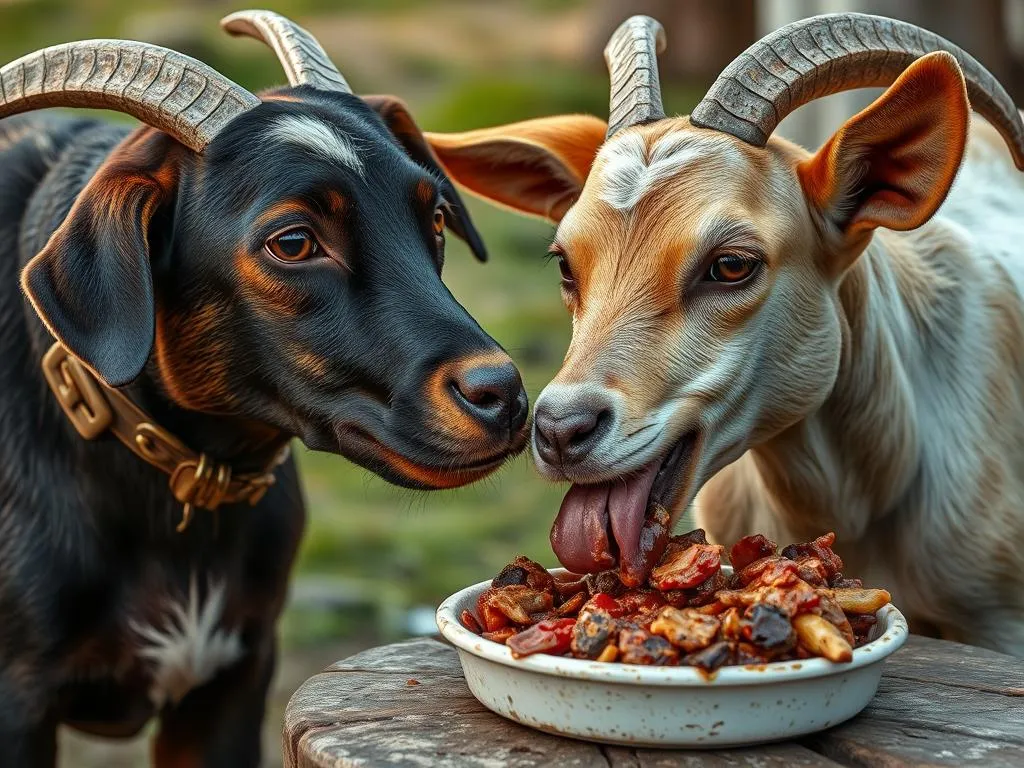
Introduction
Understanding the nutritional needs of dogs is crucial for their overall health and well-being. A balanced diet contributes significantly to a dog’s longevity, energy levels, and quality of life. Among the various protein sources available, goat meat stands out as a potential option for dog owners seeking to diversify their pets’ diets. This article delves into the question: can dogs eat goat meat? We’ll explore its safety, nutritional benefits, and how it can be incorporated into your dog’s meals.
Understanding Dog Nutrition
Essential Nutrients for Dogs
Dogs require a balanced intake of several essential nutrients to thrive:
- Proteins: Critical for growth, muscle development, and tissue repair.
- Fats: Provide energy and support cell function, while also aiding in the absorption of fat-soluble vitamins.
- Carbohydrates: Serve as an energy source and can aid digestive health.
- Vitamins and minerals: Vital for various bodily functions, including bone health, immune function, and metabolism.
Role of Protein in a Dog’s Diet
Protein plays a fundamental role in a dog’s diet. It is essential for growth, maintenance, and repair of tissues. Proteins are made up of amino acids, some of which are essential and must be obtained from food. Common sources of protein in a dog’s diet include meat, fish, eggs, and certain plant-based foods.
Common Dietary Myths about Dogs
There are several misconceptions surrounding dog nutrition. For instance, many believe that dogs are strictly carnivorous, while in truth, they can digest and benefit from a variety of food types, including certain grains and vegetables. Another myth is that all human food is harmful to dogs, when in reality, many human foods, including some meats, can be healthy for dogs when prepared properly.
Goat Meat as a Protein Source
Nutritional Profile of Goat Meat
Goat meat is known for its unique flavor and nutritional benefits. Here’s a breakdown of its macronutrients:
- Protein: Approximately 25 grams per 100 grams.
- Fat: About 3.5 grams, making it a lean meat option.
- Carbohydrates: Minimal, typically around 0 grams.
In addition to macronutrients, goat meat is rich in vitamins and minerals such as iron, potassium, and vitamin B12, which are beneficial for your dog’s health.
Comparison with Other Meats
When compared to other commonly fed meats like chicken, beef, and lamb, goat meat offers several advantages:
- Lower fat content: Goat meat is generally leaner than beef and lamb.
- Higher iron content: Beneficial for dogs needing an iron boost.
- Less likely to cause allergies: Goat meat is considered a novel protein source, making it a good option for dogs with food sensitivities.
Can Dogs Eat Goat Meat?
Safety Considerations
Before introducing any new food into your dog’s diet, it’s essential to consider safety. While dogs can eat goat meat, there are some precautions to take:
- Allergens and sensitivities: Monitor your dog for any signs of allergies, such as itching, gastrointestinal upset, or changes in behavior.
- Raw vs. cooked: Raw goat meat poses a risk of bacterial contamination. Cooking the meat thoroughly reduces these risks and makes it easier for dogs to digest.
Health Benefits of Goat Meat for Dogs
Including goat meat in your dog’s diet can provide several health benefits:
- Lean protein source: Ideal for weight management, helping maintain lean muscle mass.
- Anti-inflammatory properties: Goat meat contains nutrients that may help reduce inflammation.
- Good for allergies: As a novel protein, it can be beneficial for dogs with specific food allergies or sensitivities.
Recommended Serving Sizes and Frequency
When introducing goat meat, it’s important to do so gradually. Here are some guidelines:
- Small dogs: Start with 1-2 ounces per serving.
- Medium dogs: 2-4 ounces per serving.
- Large dogs: 4-6 ounces per serving.
Introduce goat meat into your dog’s diet 2-3 times a week, gradually increasing the amount as they adjust.
How to Prepare Goat Meat for Dogs
Cooking Methods
When preparing goat meat for your dog, opt for healthy cooking methods:
- Boiling: Keeps the meat tender without added fats.
- Grilling: Adds flavor but should be done without harmful seasonings.
- Baking: A great option that retains nutrients.
Avoid using any seasonings or additives that may be harmful to dogs, such as garlic, onion, or excessive salt.
Portioning and Serving Suggestions
Portioning goat meat according to your dog’s size is crucial. You can mix it with dog-friendly ingredients such as:
- Cooked vegetables (e.g., carrots, peas)
- Brown rice or quinoa
- Dog-safe fruits (e.g., blueberries, apples)
This combination provides a balanced meal rich in nutrients.
Potential Risks and Considerations
Allergies and Sensitivities
Introducing new protein sources can lead to allergies. Watch for symptoms like:
- Itching or skin irritations
- Gastrointestinal issues (vomiting, diarrhea)
- Changes in energy levels
If you notice any of these signs, consult your veterinarian.
Risk of Obesity and Overfeeding
While goat meat is a healthy option, it’s essential to manage caloric intake. Overfeeding can lead to obesity, which brings various health issues. Ensure that goat meat is part of a balanced diet that meets your dog’s nutritional needs.
Veterinary Consultation
Before making significant changes to your dog’s diet, especially if they have pre-existing health conditions, consult your veterinarian. They can provide tailored advice based on your dog’s individual dietary needs.
Alternatives to Goat Meat
Other Protein Sources
If you’re considering alternatives, several protein sources can benefit your dog’s diet:
- Turkey: A lean meat that’s often well-tolerated.
- Fish: Rich in omega-3 fatty acids, beneficial for skin and coat health.
- Venison: Another lean protein that can be good for dogs with allergies.
Plant-Based Proteins
For those interested in vegetarian or vegan options, some plant-based proteins can be included, such as:
- Lentils
- Chickpeas
- Peas
These can be used in moderation alongside other protein sources to create a balanced diet.
Commercial Dog Foods with Goat Meat
There are several high-quality commercial dog foods that include goat meat as a primary ingredient. These products are formulated to provide balanced nutrition and can be an excellent way to incorporate goat meat into your dog’s diet without the need for home preparation.
Conclusion
In summary, dogs can eat goat meat, and it can be a nutritious addition to their diet. It offers numerous health benefits, including being a lean protein source and possibly aiding dogs with food sensitivities. However, it’s essential to introduce it carefully, monitor your dog’s reaction, and ensure a balanced diet overall. Goat meat can be a delightful and healthy treat for your furry friend when prepared correctly and served in appropriate portions.
FAQs
Can all dogs eat goat meat?
Yes, most dogs can eat goat meat, but it’s essential to monitor them for any allergic reactions.
Is goat meat good for dogs with allergies?
Yes, goat meat is a novel protein and may be suitable for dogs with certain food allergies.
How should goat meat be cooked for dogs?
Goat meat should be cooked thoroughly without any harmful seasonings, using methods like boiling or baking.
What are the signs of food allergies in dogs?
Common signs include itching, gastrointestinal upset, and changes in behavior or energy levels.
How often can I feed my dog goat meat?
Introduce goat meat 2-3 times a week, adjusting portion sizes based on your dog’s size and dietary needs.









